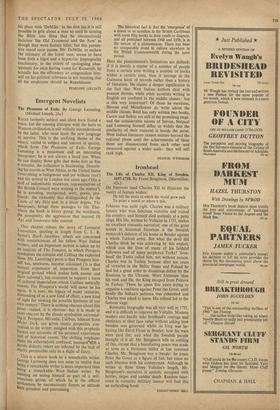Ironhead
DR JOHNSON used Charles XII to illustrate the vanity of human wishes:
He left the name at which the world grew pale To point a moral or adorn a talc.
Johnson was quite right. Charles was a military lunatic who won fabulous victories and ruined his country; and himself died uselessly at a petty siege. His life, written by Voltaire in 1731, makes an excellent romantic narrative; one of the great scenes in historical literature is the Swedish monarch's defence of his house at Bender against a whole Turkish army. But what the devil did Charles think he was achieving by this exploit, which cost the lives of many of his faithful followers and of many perplexed Turks? 'Iron- head' the Turks called him, not without reason. Charles was in Turkey because after ten years of victories in the Baltic States and Poland he had led a great army to disastrous defeat by the Russians in the Ukraine. More fortunate than his rank and file, the King escaped from Poltava to Turkey. There he spent five years trying to organise a coalition against Peter the Great, until finally the Sultan's patience was exhausted and Charles was asked to leave. His refusal led to the famous siege.
Romantic biography was all very well in 1731, and it is difficult to improve on Voltaire. Modern readers can hardly take Ironhead's courage and obstinacy at their face value without asking how Sweden was governed whilst its king was be- having like Errol Flynn in Bender; how his wars were paid for; and what the Swedish people thought of it all. Mr. Bengtsson tells us nothing of this, except that a humiliating peace was made as soon as a fortunate bullet at last removed Charles. Mr. Bengtsson was a Swede: he treats Peter the Great as a figure of fun, but takes no such liberties with his countryman. Although he writes at three times Voltaire's length, Mr. Bengtsson's narrative is entirely occupied with battles, sieges and sudden death. Readers inter- ested in romantic military lunacy will find this an enthralling book.
CHRISTOPHER HILL






















































 Previous page
Previous page